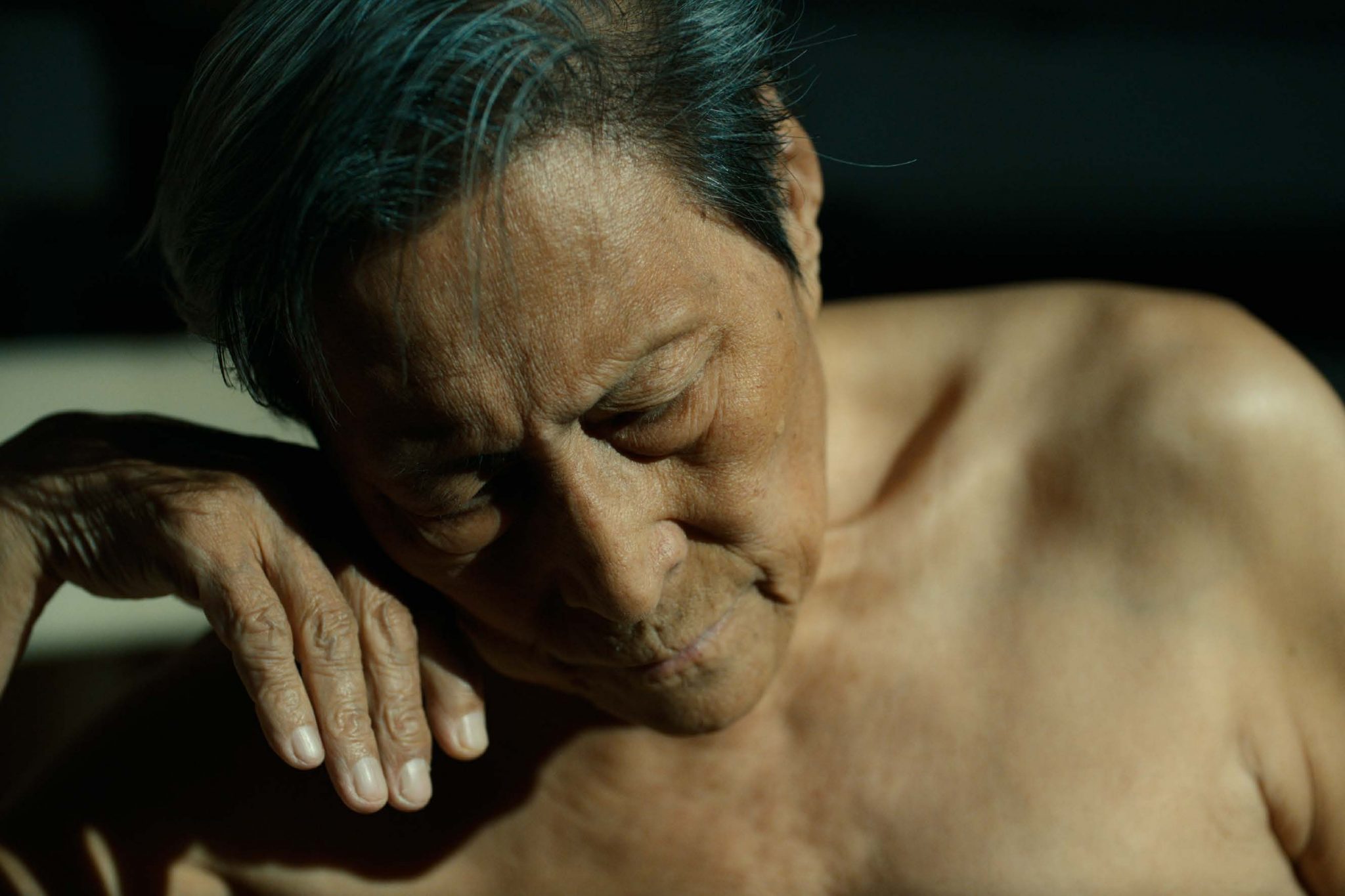The Xi’an-born, Paris-based director speaks to ArtReview Asia about his new film Hei Yi Ren (Man in Black), compassionate cinema and the act of witness
The filmic style of Xi’an-born, Paris-based director Wang Bing is characterised by his lengthy, immersive documentary odysseys. Ever the observer, Wang silently follows his protagonists, neither stepping in on the situations he films, nor backing away from them. In 1999 he started his first and best-known project, Tie Xi Qu (West of the Tracks, 2003), a three-part documentary film that runs more than nine hours and went on to win the Grand Prix at the Marseille International Film Festival in 2003. For the ambitious project, Wang spent hundreds of hours filming the lives of factory workers, loitering teenagers and a single father and his son, all of whom lived in the declining industrial district of Tiexi in Shenyang, northeastern China; each of the three chapters (‘Rust’, ‘Remnants’ and ‘Rails’) traverses the spaces of socialist ruins, infrastructural decay and the lives that are lived among both. The straight, artless portrayal of the neglected underclass in West of the Tracks can be seen throughout his later works, which zoom in upon those living, like left-behind children, near China’s Sino-Burmese border (San Zimei [Three Sisters, 2012]), patients of a Yunnan mental asylum (Feng Ai [‘Til Madness Do Us Part, 2013]) as well as survivors of pre-Cultural Revolution labour camps in the northwestern Gansu province (Si Ling Hun [Dead Souls, 2018]).
Wang Bing’s most recent film, the hour-long Hei Yi Ren (Man in Black, 2023), which screened at the Cannes Film Festival this year, is more concerned with aesthetics, documenting a performance to the camera. The film – shot in Théâtre des Bouffes du Nord in Paris – revolves around the experience of Chinese symphony composer and conductor Wang Xilin, who was imprisoned during the Cultural Revolution, and who now lives in exile in Germany. Standing naked onstage, Wang Xilin paces the empty theatre, revisiting and reenacting his torture at the hands of Chinese authorities, and for the first time he elaborates on symphonies of his that use different instruments to recreate the sounds of torture – clattering of shackles, splashing whips and hot red iron sizzling on human flesh. As excerpts from his compositions play in the background, at times drowning the voice of Wang Xilin himself, we are thrown into a space inundated by the traumas of history. To mark the new release, Wang Bing took time to reflect on his approaches to filmmaking and documentary practices.
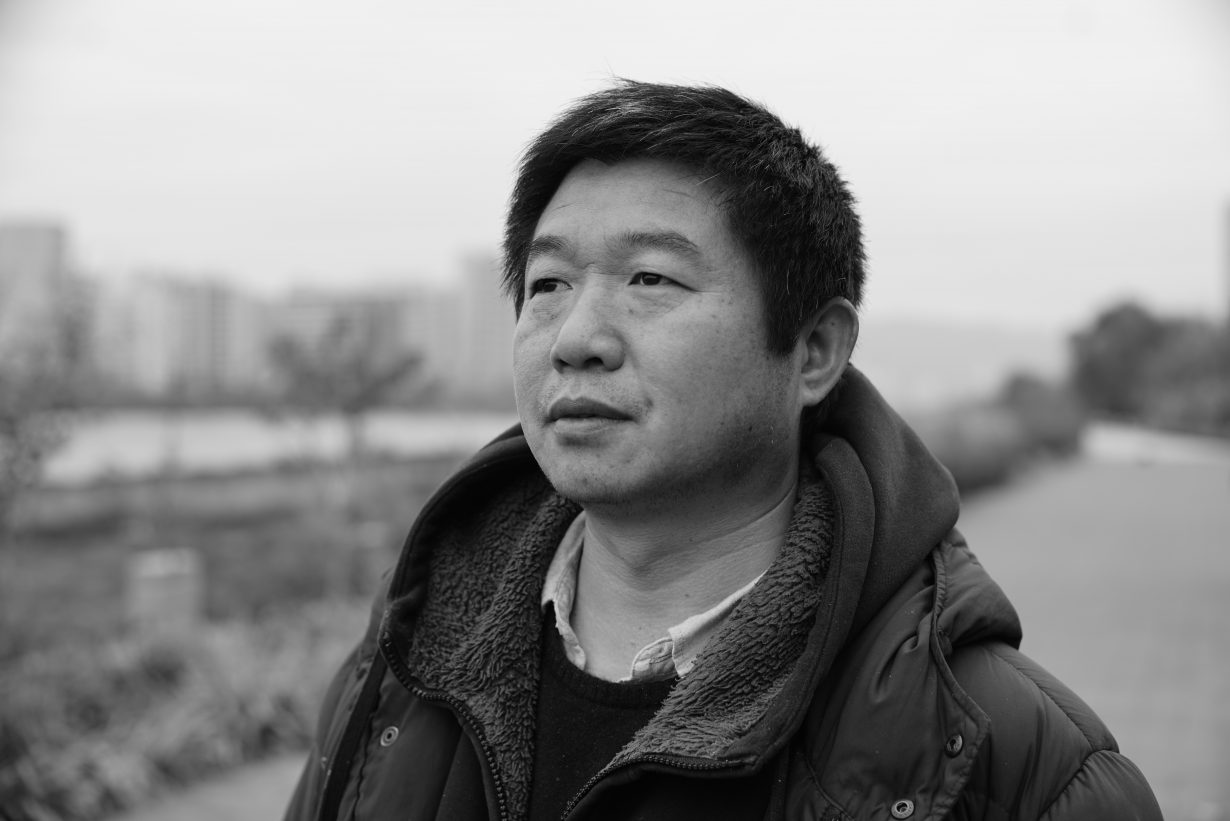
Careful Planning Meets Sudden Decisions
ArtReview Asia How did you meet Wang Xilin and what prompted you to make a film about him?
Wang Bing Before I met Mr Wang Xilin in 2006 I’d done similar portraitesque projects, such as He Fengming [Fengming, a Chinese Memoir, 2007; with interviews recorded in 2003]. I simply had a good personal relationship with Wang. By 2019 I knew that I wanted to make a personal portrait of him. At the time he had just moved from Beijing to Germany. I thought it would be good to make a film about him and it would be quick and easy to do a video portrait in Paris. That was how the plan came into place.
ARA This work seems more performative than many of your others.
WB Most of my other works are more realistic – people were filmed in their natural habitats – and more dialogue-based. But Wang Xilin is a musician and I wanted to portray a psychological space around him via his music. Then the pandemic began, so it wasn’t until 2021 that I actually started preparing for Hei Yi Ren [Man in Black].
ARA You have said before that if you do not know enough about the subject you are filming, the work is not going to come out well. Did you study Wang Xilin’s music beforehand or was it based on your familiarity with Wang himself?
WB I didn’t think too much about it, I was just familiar with him. Then I thought it would be better to use his body in this way. So I chose to shoot in the nude.
ARA Why did you decide to do that?
WB Filming him in the nude was a very sudden decision. I simply thought that it would be good to focus on his body. I called him to ask if I could film him naked; he was fine with it. I think he had a lot of trust in me, in following my ideas. He probably thought that there must have been a reason behind whatever I wanted to do.
ARA Was that trust something you developed during the process of filming?
WB No. Everything was based on an idea that we had previously worked out: we only had three days to shoot the film. There was not much time to stop to prepare or negotiate during the process. I told Wang Xilin in advance about which part of his music I needed him to sing as well as what I was going to shoot. As soon as we arrived at the site, we got things rolling.
ARA He’s very open in this film. Do you think this candidness is related to his nakedness? Do you think it would have made a difference had he been filmed wearing clothes?
WB I didn’t think about it. We decided on filming him naked from the beginning, so we didn’t think about how it would be with clothes on.
ARA How did you select the music for the film?
WB I discussed the selections with him, but ultimately there was not much of a theme. It was mainly just that I like some of his works better than others. The passages he sings in the film are all the parts that I like.
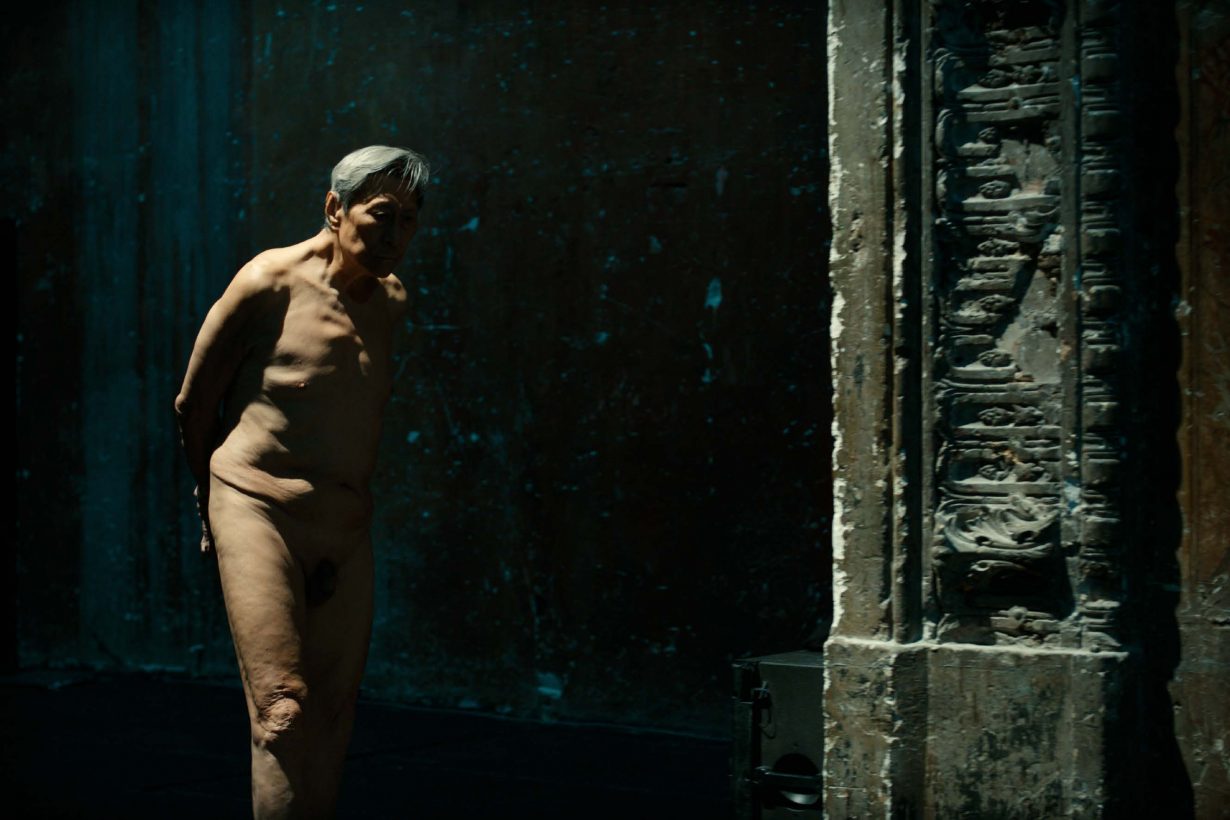
Witnessing, Understanding
ARA The setting for Man in Black is different from that of your previous works, which often feature people in their daily surroundings. Could you talk about your decision to shoot the film in a theatre?
WB Théâtre des Bouffes du Nord is very famous. It is also quite unique in that it is a Roman-style amphitheatre but built indoors. In this space, there is very little distance between the stage and the audience. In effect it’s like there is no boundary between the two. In that sense, Wang Xilin is often seen walking between the stage and the auditorium, in a way that suggests that he is both actor in and witness to his memories.
ARA At the beginning and end of the film, we see Wang Xilin circling around the theatre; when he is standing on the stage, the camera pans around his body. It seems to me that these movements emphasise a feeling of being caught up in a cycle of history.
WB Of course. But I’d also say that his and the camera’s movements are the product of what the space affords; and the theatre itself has a circular shape, including the stairs and the stage. Filmmaking happens in real spaces and your camera movements cannot conflict with the space itself. So, of course, the camera lens has to follow a circular motion.
ARA In a way, the space of Théâtre des Bouffes du Nord could be read as an embodiment of the stage of history, on which Wang Xilin’s accounts of memories are reenacted with bodily movement. His personal history is both retrieved from the mind and recreated by the body. How do you see history as a documentary filmmaker? Do you think history can be objectively recorded?
WB Of course history can be recorded, but it is hard to say what is objective. What standards determine whether it is objective or not? To call it ‘history’ is to define Wang Xilin’s experience as a text. That’s a classification other people might impose and something about which I cannot do a lot. There might be echoes, connections: many people may share similar experiences to those of Wang. But really, he was just talking about his experiences and the inspirations for his music, and that willingness to explain his life and art to the public is a personal decision. For me, I am not trying to show a history. Above everything, I want to pay my respects to Wang Xilin as an individual.
ARA Do you think that reconnecting with past memories onstage had an effect on the way he looked at them?
I don’t know, it’s his own business.
ARA Did you learn anything new about his experience? How did you feel about it?
WB I don’t think there are any old or new problems, just a case of getting to know him better. As for any specific understanding, I don’t think I know. It is good that he was willing to talk about many things and it worked for the film.
ARA Are you bothered about whether or not your audience understands your subject in the same way as you do?
WB For me, filmmaking is not that complicated. If you make a film about Wang Xilin, that will let people know more about his experiences, his thoughts and what he is like now. All my works serve the particular people I am filming, so it’s enough to just figure out and narrate the stories of these people clearly. As for how others think when they rewatch the film, that’s something else.
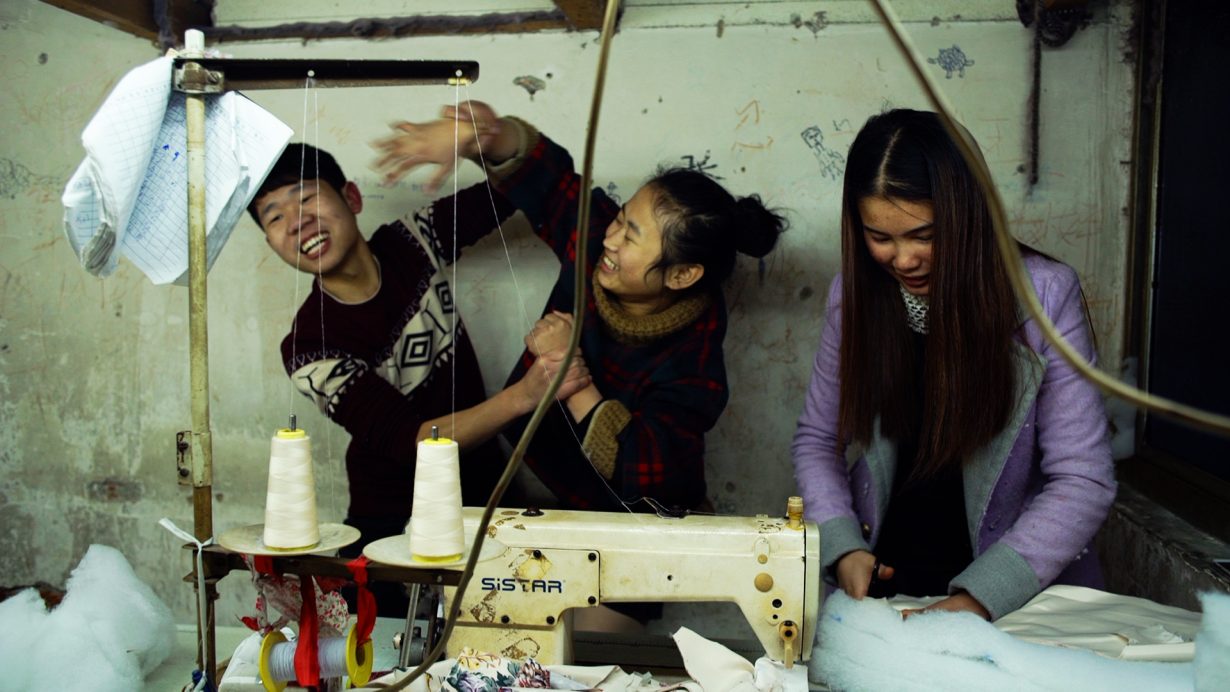
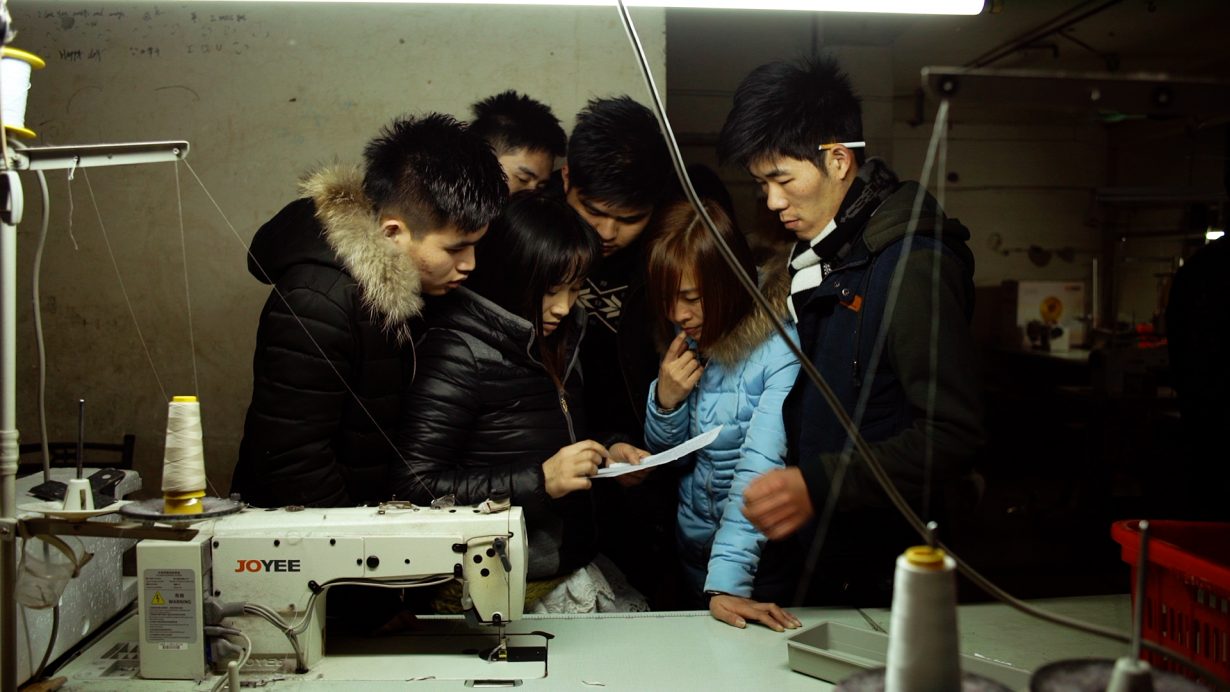
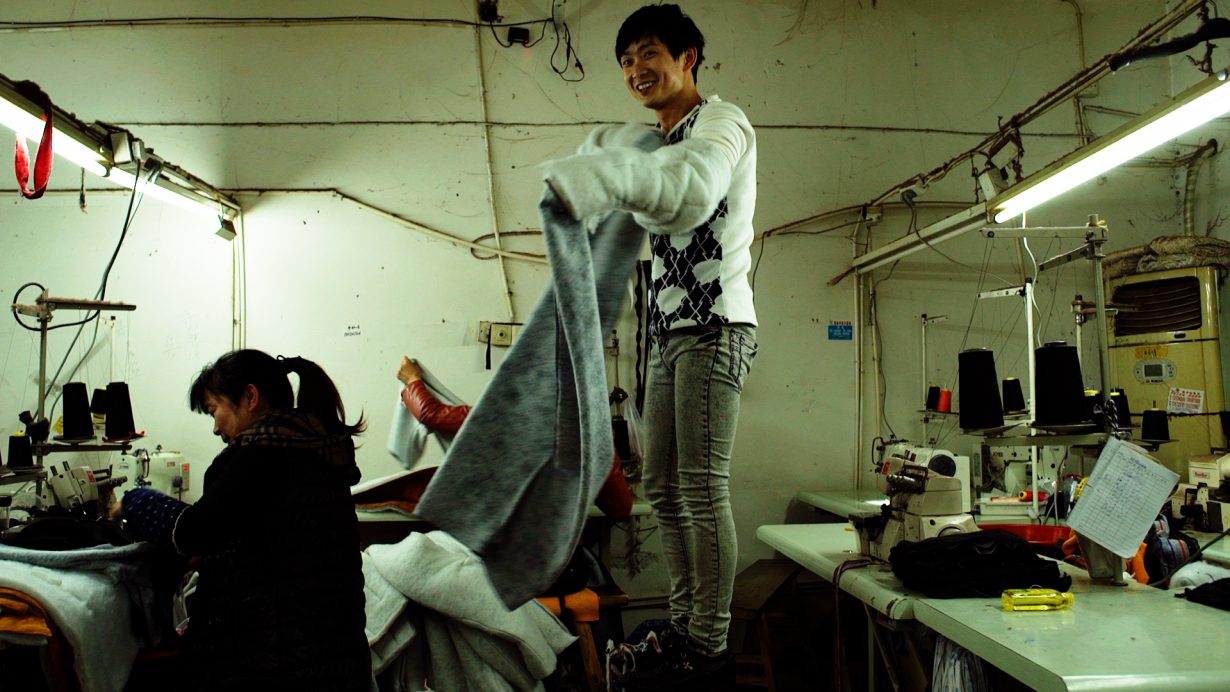
Narration and Projection
ARA You often talk about a decentralised form of narrative in interviews. Qingchun [Youth (Spring) (2023); the first three-hour chapter of a documentary trilogy focusing on the lives of young textile workers in a small town Zhili, Zhejiang province, located 130 kilometres from Shanghai], which was recently nominated for the Palme d’Or at the Cannes Film Festival, and West of the Tracks both use this technique. What does decentralisation mean to you?
WB Stories can be told in many ways. There are many characters in my films, and they’re the main body of my film. To be true to that, you cannot deliberately focus on a single character; in that instance a decentralised narrative is more appropriate. More than that, it’s more natural and less constructed – it’s closer to how we live our lives.
Man in Black explicitly focuses on one person, so it’s not necessary for other characters to get into it. And even though Fang Xiuying [Mrs. Fang, 2017; an 86-minute piece documenting the last ten days of a sixty-eight-year-old bedridden woman suffering from Alzheimer’s] also focuses on one person, it was filmed in her home, where she was surrounded by her daughter, uncle and other neighbours. It is a complex background, and the relationship between the people filmed was freer and more balanced. I wouldn’t deliberately delete all the information and characters passing by. But, in the end, decentralisation is just the word that is sometimes useful when explaining my films. The concept itself is not my goal – my goal is to make films.
ARA In your works, you are often a quiet observer who almost disappears into the scenes, rather than disrupting what’s happening. Of course, you may choose to create tensions within the space, or certain effects despite it, but that does not seem to be what you are interested in.
WB I think human beings tend to find a corresponding relationship with the environment, or a kind of adaptation, because people generally would not behave in a way contradictory to the space around them. They are both corresponding to each other.
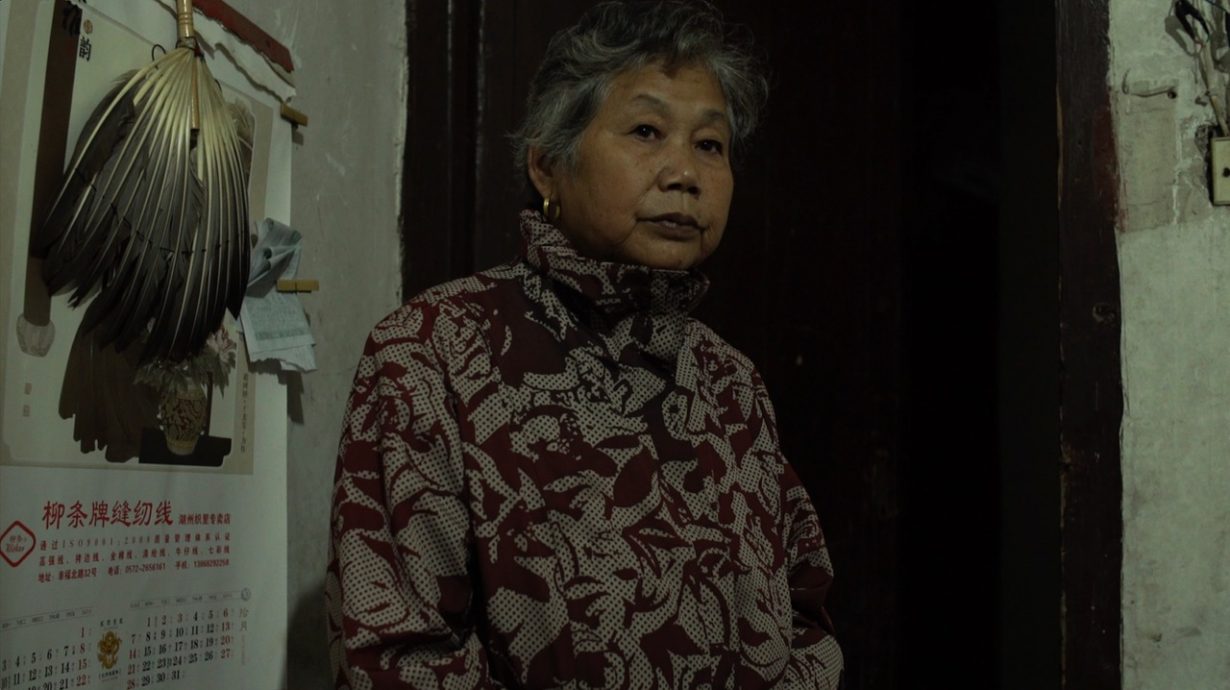
ARA Generally, you maintain a very calm and compassionate visual language. That being said, do you think there is a kind of cruelty in the camera’s gaze itself? For example, in Mrs. Fang, when you film Fang on her sickbed, the camera and her eyes are trained on each other for a long time, while people in the room talk about her. As a patient with Alzheimer’s disease, filmed after she lost the ability to act and respond, Fang’s stare produces an uncanny distance between the audience and her. The camera’s presence becomes very prominent. Have you ever considered the relationship the camera has with its subjects?
WB The camera’s presence is always implicated in any act of recording. It is impossible to assume that the machine is not present; there will be no image if it is not present.
It may embody a certain perspective, but at the same time it is a neutral instrument that serves to convey the situation of its subjects. It just records the light, right?
The source of violence is not the act of recording, but its content. And whether or not the content is violent is subject to the judgement of each viewer. Every person would have a different response as well as a different threshold for violence. That standard varies.
The ‘violence of the camera lens’ is a psychological projection. If you feel a particular way, that’s your own psychology. But your inner activity can’t represent someone else’s. Just as much as your views on images do not represent my views on images, and I cannot justify or explain the emotions you might have while watching one of my films.
ARA Have you seen any films that you admired recently?
WB Two days ago I watched Adieu Philippine [Farewell, Philippine, 1962] by Jacques Rozier, a director who passed away a few weeks ago. I hadn’t paid attention to it before. When I saw it, I thought it was exactly the same as my style. Of course, I have to say that I am like him, not he like me.
ARA Do you have any plans for future shoots?
WB I still have two films in postproduction, so I don’t have the energy to think about new films right now.
